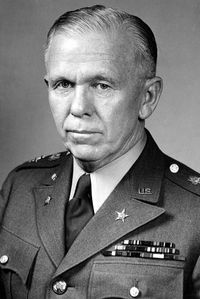George Catlett Marshall Jr., a distinguished American army officer and statesman of great renown, entered this world on December 31, 1880, commencing a remarkable journey that would ultimately lead to a plethora of esteemed achievements and milestones.
Winston Churchill, renowned for his astute perceptions, bestowed upon General George Marshall the esteemed title of "organizer of victory", a testament to the latter's instrumental leadership in guiding the Allied forces to a triumphant conclusion in World War II. Despite this resounding success, Marshall's endeavors in the post-war era were beset by frustration, as he grappled with the daunting task of forestalling the looming Chinese Civil War, a challenge that ultimately proved insurmountable, leaving a lasting sense of disappointment in its wake.
Marshall's tenure as Secretary of State and Secretary of Defense under the Truman administration was marked by a profound impact on the country's foreign policy trajectory. As a stalwart champion of a robust U.S. economic and political commitment to post-war European recovery, Marshall's unwavering dedication to this cause ultimately gave rise to the conception and implementation of the landmark Marshall Plan. This far-reaching initiative, designed to revitalize the war-ravaged continent, was a testament to Marshall's astute diplomatic acumen and his unshakeable commitment to promoting global stability and prosperity.
Marshall's tireless endeavors to foster a climate of peaceful coexistence and stability, marked by his unwavering commitment to diplomatic endeavors, ultimately culminated in the prestigious Nobel Peace Prize bestowed upon him in 1953, serving as a poignant tribute to his lasting and profound impact as a statesman and diplomat, whose remarkable legacy continues to resonate with generations to come.






















